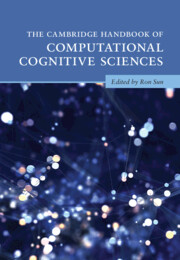Book contents
- The Cambridge Handbook of Computational Cognitive Sciences
- Cambridge Handbooks in Psychology
- The Cambridge Handbook of Computational Cognitive Sciences
- Copyright page
- Contents
- Preface
- Contributors
- Part I Introduction
- Part II Cognitive Modeling Paradigms
- Part III Computational Modeling of Basic Cognitive Functionalities
- 11 Computational Models of Categorization
- 12 Computational Cognitive Neuroscience Models of Categorization
- 13 Models of Inductive Reasoning
- 14 Analogy and Similarity
- 15 Mental Models and Algorithms of Deduction
- 16 Computational Models of Decision Making
- 17 Computational Models of Skill Acquisition
- 18 Computational Models of Episodic Memory
- 19 Computational Neuroscience Models of Working Memory
- 20 Neurocomputational Models of Cognitive Control
- 21 Computational Models of Animal and Human Associative Learning
- 22 Computational Cognitive Models of Reinforcement Learning
- Part IV Computational Modeling in Various Cognitive Fields
- Part V General Discussion
- Index
- References
21 - Computational Models of Animal and Human Associative Learning
from Part III - Computational Modeling of Basic Cognitive Functionalities
Published online by Cambridge University Press: 21 April 2023
- The Cambridge Handbook of Computational Cognitive Sciences
- Cambridge Handbooks in Psychology
- The Cambridge Handbook of Computational Cognitive Sciences
- Copyright page
- Contents
- Preface
- Contributors
- Part I Introduction
- Part II Cognitive Modeling Paradigms
- Part III Computational Modeling of Basic Cognitive Functionalities
- 11 Computational Models of Categorization
- 12 Computational Cognitive Neuroscience Models of Categorization
- 13 Models of Inductive Reasoning
- 14 Analogy and Similarity
- 15 Mental Models and Algorithms of Deduction
- 16 Computational Models of Decision Making
- 17 Computational Models of Skill Acquisition
- 18 Computational Models of Episodic Memory
- 19 Computational Neuroscience Models of Working Memory
- 20 Neurocomputational Models of Cognitive Control
- 21 Computational Models of Animal and Human Associative Learning
- 22 Computational Cognitive Models of Reinforcement Learning
- Part IV Computational Modeling in Various Cognitive Fields
- Part V General Discussion
- Index
- References
Summary
This chapter provides a selective review of the issues that have dominated computational models of associative learning in recent decades. Associative learning research concerns the simplest and most fundamental processes by which humans and other animals come to predict events in their environment based on past experience. It has far-reaching implications for understanding adaptive and maladaptive human behavior. With a focus on Pavlovian conditioning and adjacent subdisciplines, this chapter explores how the prediction error learning algorithm has shaped understanding of competitive learning, selective attention, stimulus representation, and learning about absent events. A number of alternative computational approaches will be introduced, along with some remaining challenges in the computational modeling of human and animal associative learning.
Keywords
- Type
- Chapter
- Information
- The Cambridge Handbook of Computational Cognitive Sciences , pp. 703 - 738Publisher: Cambridge University PressPrint publication year: 2023

